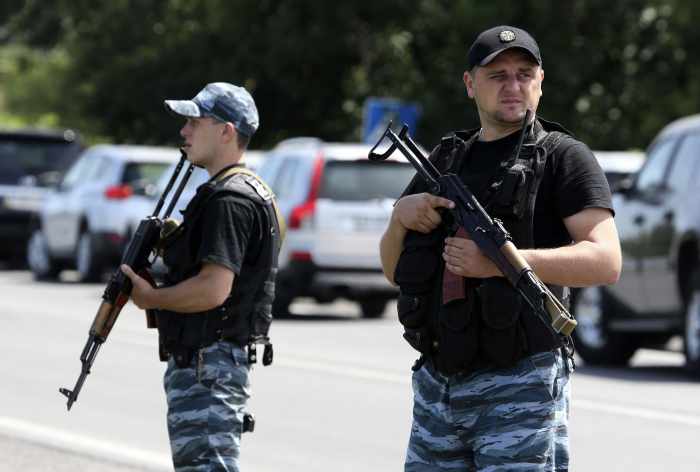Russia sanctions ramped up as Kiev says forces near crash site

– World news selected by Gazette editors for Phuket’s international community
PHUKET: U.S. and European leaders agreed on Monday to impose wider sanctions on Russia’s financial, defence and energy sectors as Ukraine said its forces advanced towards the crash site of Malaysian flight MH17.
The new sanctions, which U.S. President Barack Obama and leaders of Germany, Britain, France and Italy discussed in a conference call, are aimed at increasing the pressure on Russian President Vladimir Putin after the Malaysian airliner was shot down over territory held by pro-Moscow rebels in eastern Ukraine.
“It’s precisely because we’ve not yet seen a strategic turn from Putin that we believe it’s absolutely essential to take additional measures and that’s what the Europeans and the United States intend to do this week,” said Tony Blinken, a national security adviser to Obama.
The crash earlier this month has led to calls for much tougher action against Russia from Western countries who had previously imposed sanctions but only on small numbers of individuals and firms.
EU member states were expected to try to reach a final deal on Tuesday on stronger measures that would include closing the bloc’s capital markets to Russian state banks, an embargo on future arms sales and restrictions on energy technology and technology that could be used for defence.
In Brussels, EU sources said diplomats had reached preliminary agreement on a new list of companies and people, including associates of Putin, to be targeted by asset freezes.
Western states believe that the rebels brought down Malaysia Airlines flight MH17, with the loss of 298 lives, using a missile supplied by Russia.
“The latest information from the region suggests that even since MH17 was shot down, Russia continues to transfer weapons across the border and to provide practical support to the separatists,” said a statement issued by British Prime Minister David Cameron after the leaders’ call.
“Leaders agreed that the international community should therefore impose further costs on Russia and specifically that ambassadors from across the EU should agree a strong package of sectoral sanctions as swiftly as possible.”
Russia has blamed the Ukrainian military for the tragedy, which deepened a crisis that erupted when a pro-Moscow Ukrainian president was forced from power and Russia annexed Crimea in March.
Earlier in the day, Russian Foreign Minister Sergei Lavrov said sanctions imposed by the United States and the EU on officials and companies would not achieve their goal.
“We will overcome any difficulties that may arise in certain areas of the economy, and maybe we will become more independent and more confident in our own strength,” he told a news conference.
GOVERNMENT FORCES ADVANCE
The Ukrainian government said on Monday its troops had wrested more territory from the rebels and were moving towards the crash site which international investigators said they could not reach because of the fighting.
Troops recaptured two rebel-held towns near the site and were trying to take the village of Snezhnoye, near where Kiev and Washington say rebels fired the surface-to-air missile that shot down the airliner, Ukrainian officials said.
One pro-government militia said 23 of its men had been killed in fighting in the past 24 hours, while a rebel commander said he had lost 30 soldiers.
Analysis of black box flight recorders from the airliner showed it was destroyed by shrapnel from a missile blast which caused a “massive explosive decompression”, a Ukrainian official said on Monday.
Investigators in Britain, who downloaded the data, had no comment. They said they had passed information to the international crash investigation led by the Netherlands, whose nationals accounted for two-thirds of the victims.
In a report on three months of fighting between government forces and separatist rebels who have set up pro-Russian “republics” in the east, the United Nations said more than 1,100 people had been killed.
U.N. High Commissioner for Human Rights Navi Pillay said increasingly intense fighting in the Donetsk and Luhansk regions was extremely alarming and the shooting down of the airliner on July 17 may amount to a war crime.
The separatists are still in control of the area where the plane was shot down but fighting in the surrounding countryside has been heavy as government forces try to drive them out.
On Monday at least three civilians were reported killed in overnight fighting, and Kiev said its troops recaptured Savur Mogila, a strategic piece of high ground about 30 km (20 miles) from where the Boeing hit the ground, and other areas under rebel control. Rebels denied Savur Mogila had been lost, saying fighting was continuing.
The crash site has yet to be secured or thoroughly investigated, more than 10 days after the crash. After days in which bodies lay untended in the sun, rebels gathered the human remains and shipped the bodies out, and turned over the flight recorders to a Malaysian delegation.
But the wreckage itself is still largely unguarded, and much of it has been moved or dismantled in what the rebels say was part of the operation to recover the bodies. No full forensic sweep has been conducted to ensure all human remains have been collected. Both side accuse the other of using fighting to prevent the investigation.
The Organization for Security and Co-operation in Europe said its observers attempting to reach the crash site with investigators from Australia and the Netherlands were forced to return to Donetsk for “security reasons”.
A rebel leader, Vladimir Antyufeyev, told reporters in Donetsk that separatist fighters escorting the international experts to the site encountered fighting and turned back.
Antyufeyev, who like most of the senior rebel leadership is an outsider from Russia, also blamed the “senseless” Ukrainian army for trying to destroy evidence at the crash site under cover of fighting.
— Phuket Gazette Editors
Latest Thailand News
Follow The Thaiger on Google News:


























